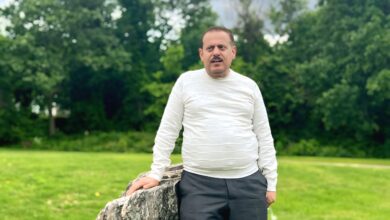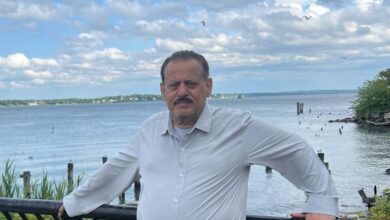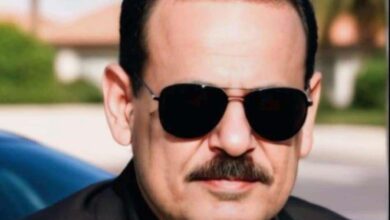!! Ideology

Yemeni mp
Ahmed Saif Hashed
Yesterday, perhaps, I was stripped of awareness, my mind eclipsed and my thoughts subdued. Today, I grieve and mourn for all those still dispossessed of their own consciousness, for those whose minds have been taken from them. I see how much they are victims, deceived and misled. I pity them, long for their liberation, and resist every attempt at taming, subjugation, or herding into the flock. Reality, with its repeated shocks, has awakened me. I am no longer the one who surrenders his mind to another, to be shaped and reshaped at their will.
And while I remain proud of my unwavering alignment with the poor—resisting man’s exploitation of his fellow man, and striving for social justice—I have also become a defender of rights, a voice of my own, unattached to any camp or banner.
I am still rebellious against my reality—opposed to corruption, resisting tyranny and despotism. I fight against frameworks that come at the expense of free thought and the critique of reality. My allegiance is to the future. I yearn for intellectual and social freedom to the farthest extent possible, and I refuse its suppression. I refuse war, and I reject this unjust international order, as well as the imposition of this hideous capitalist reality and its predatory agendas upon the world. I am utopian, a dreamer to the extreme—this is who I am, or who I claim to be, or who I wish and aspire to become.
At university, I was drawn to what was called the ideology of scientific socialism. I longed for its courses with the passion of a lover. I felt myself fully alive while attending its lectures with my peers. I absorbed fascinating new knowledge, adding it to my own, and felt an insatiable hunger for more. Yet the more I knew, the more I delighted in the drowning, yearning for yet greater depths—while at the same time sensing how small and insignificant I was before the vast sea of knowledge! These were truths I found both useful and pleasurable, and my desire grew restless to grasp even more, until I sometimes appeared to myself like a greedy merchant who never settles for little—except that my “merchandise” was of another kind. I read what was prescribed, and what lay beyond, and in the examinations of those subjects I earned the highest scores and ranks.
During my studies in the Faculty of Law, I achieved my best results and final marks in this ideology and the subjects built upon it. I scored 96% in Scientific Socialism, 94% in Philosophy, 90% in Political Science, 95% in Theoretical Issues, 100% in the History of the Yemeni Revolution, 98% in the History of the State and Law, and 88% in the Theory of State and Law.
I was fascinated by the laws and propositions of Marxist philosophy. I took joy in comparing theory with what unfolds in reality, observing its applications in nature, society, and consciousness: the law of the unity and struggle of opposites, the law of the transformation of quantitative accumulations into qualitative changes, the law of the negation of the negation, the notions of the general and the particular, chance and necessity, and others. I felt these laws and principles at work in everything. At the same time, I felt philosophy to be a vast cosmic realm—a wise, dazzling, and delightful science.
I was once dogmatic, perhaps even claiming that the ideology of scientific socialism was the one true ideology among all others, that it alone possessed the truth and held the answers to every question, that the foremost feature of our age was the transition from capitalism to socialism. Yet, at the same time—and in keeping with the very ideology I embraced—I believed that the measure of truth is reality itself. And I sensed that something was amiss in the theory: that much of what was theoretical forced itself upon reality, often clashing with the very facts that reality laid bare.
Driven by both ideology and emotion, I would suppress the doubts that occasionally crept into me, especially when they touched upon political or social realities. But the recurrence of certain facts, their patterns, the comparisons between earlier events and later ones, and the imposition of theory upon them—these made me acutely aware of the contradictions and dissonance, of the widening gap between the theoretical and the real. At times, I felt it a grave error to force reality into the straitjacket of theory, insisting that the world conform to its dimensions. And on rare but decisive occasions, it was as though a great hammer struck my head, shattering the theory I had settled so firmly within.
I would read of class struggle, of communist parties, of the dictatorship of the proletariat, of the petty bourgeoisie, of infantile leftism—and doubt would haunt me. Then reality would come to dismantle my convictions. I would ask myself: how could a party calling itself the Polish Workers’ Party—the communist party claiming to represent the working class—and the Polish government it appointed, both stand against the labor movement and the very trade unions of the workers, even imposing martial law upon them? How could they strip unions of their right to represent the workers, when the unions’ membership was larger than that of the party that pretended to speak in their name?
Elsewhere, I was bewildered to see the fierce political conflict in the South refusing to align with the templates of class struggle found in theory. The strife was not between rich and poor, but rather among the poor themselves. Comrades killed one another, sometimes under the charge of “right opportunism,” at other times as “infantile leftists,” or “reactionary rightists,” or “petty bourgeois.” And yet most, if not all, of them were fighters against occupation—poor, destitute, hailing from villages long steeped in hunger, want, and deprivation.
It became clear to me that the South’s political struggles had little to do with the dictatorship of the proletariat or class struggle. Any current that labeled its rivals with the ready-made terms of the books—“petty bourgeoisie,” “infantile,” “opportunist,” “anarchist”—was doing so not out of truth but as a pretext, a cover for settling scores or eliminating adversaries.
I admired Abdel Fattah Ismail, yet I also remember in Salmeen those qualities that made me admire him too—a simple, charismatic, lively man of the people, aligned with the humble, living their simplicity. But admiration never meant sanctification; it did not mean that they were beyond error, or that criticism was forbidden, or that history should not be written with impartiality and restraint.
I remember the writer Mohammed Abdulwali and ask: why was he killed, along with dozens of his valiant comrades, in that plane—if indeed it was brought down by sabotage? I grieve at the fate of Qahtan Al-Shaabi, left to wither in prison until death claimed him. I grieve at the liquidation of Faisal Abdullatif Al-Shaabi, of whom I heard nothing but good. And there were many others. The entire stage of the National Democratic Revolution was drenched in blood and cruelty, ending in catastrophe. The revolution, as they said, “devoured its own children” whenever hunger seized it, becoming ever more ravenous with each cycle of violence, until it collapsed into the calamity of January 1986.
Today I believe that for a person to be truly free, they must also be liberated from repression and ideology—or at least relieved of its weight, its fetters, its rigid molds that collide with reality. To tailor reality to fit theory is an act of great violence, if not an impossibility. And now, Islamic ideologies in all their forms have become a threat to rights, to freedoms, and to the present and future of nations—a truth reality itself affirms day after day. Freedom is what births and nourishes creativity, knowledge, and a better future. It is what our peoples need, not the imposition of doctrines by coercion and force.
I have come to the conviction that dogmatism, extremism, and ideology do not advance science or knowledge, but instead obstruct them, stifle progress itself—especially when they cease to move or evolve, substituting rigidity, stagnation, and monotony in place of growth, when they seek to impose themselves by force or by falsifying consciousness, by targeting thinkers, activists, and intellectuals who struggle for freedom, for the betterment of the poor, for social justice—not for numbing the people with lies, nor for deceiving and dispossessing minds with illusions, nor for suppressing peaceful ideas simply because they contradict or diverge.
Between yesterday and today lies blood and regret. Today weighs heavier than yesterday. Today is burdened with the savagery of capitalism, with religious ideology, with political Islam, with those who call themselves men of religion and who would force their visions and dogmas upon peoples’ present and future. Today is more wretched than yesterday. Exploitation now wears many faces, and killing in the name of God has become extravagant, senseless, and futile.
* * *






